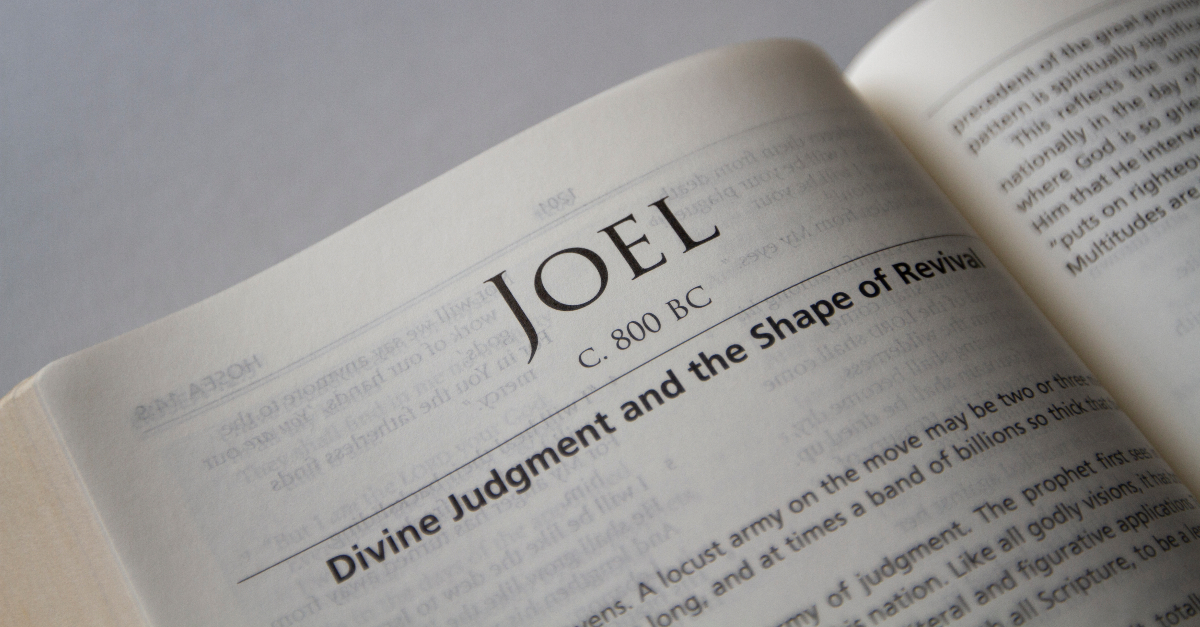These are all of the chapters of the book of Joel. Clicking on a chapter will show you the text of that chapter of Joel in the Bible (New International Version).
The prophet Joel is known as the writer of this Old Testament prophetic book, named for its author. Joel means “the Lord is God.” He was a prophet through whom God spoke. Joel is not identified or mentioned in any other of the twelve characters sharing the name of Joel. The prophet Joel is identified in this book only through his father in verse 1 which states “The word of the Lord came to Joel, the son of Pethuel.” Otherwise, there is little known about the prophet Joel. Most likely he was from Judah because there is no mention of Israel.
It appears through Scripture that Joel was not a temple prophet. He has been called a prophet of the people because of the catastrophes described in his words. These catastrophes are ones that would have affected all levels of society. His words are referred to only once in Acts 2:16.
Joel does not name any dates in his letter. What scholars have surmised is that this book was written somewhere between the 9th-4th centuries BC. It is possible it was written during the early days of Joash. This reasoning comes from the lack of references to the Babylonians, Assyrians, and Syrians. Joel does mention the Philistines, Edomites, Phoenicians, and Egyptians which sways scholars to accepting the time frame 870-865 B.C.
Joel was a resident of the Southern Kingdom, particularly of Judah and Jerusalem. Due to this he would have most likely written his prophetic words from there. He frequently mentions the blow of the trumpet in Zion, fasting, gathering the people before the Lord. This leads us to believe he would have been speaking these words from the temple court.
The setting of Joel is described as a time when Israel has been invaded by the people of Tyre, Sidon, and Philistia. It was a time of great ecological devastation as locusts had invaded the land. Devastation to the land and economy were great (1:7-20). The people of Judah regarded locusts as God’s judgment on their sins. Joel used this disaster to show the people of Judah their need to repent. There is no mention of specific sins of Judah, but they are told that God will judge their enemies and bless the faithful.
The purpose in Joel’s book is the day of the Lord. This theme permeates throughout the entire book and is mentioned 19 times by eight different authors in the Old Testament. The day of the Lord is not used to describe a specific time period. It is mentioned to correlate a general time of judgement – a time that belongs solely to the Lord.
There are three lessons we can learn from Joel today. The first is consequences from disobedience. God ultimately calls us to obedience. He cannot tolerate disobedience and like a father to a child, there are consequences. No one can escape God’s wrath. Joel speaks in chapter 1 about the swarm of locusts that have taken what the people of Judah needed most. They have become accustomed to having the blessings of God bestowed upon them. Their contentment ultimately led them to become lackadaisical in their obedience to God. The lesson for today is that we must remember that God is just. He knows what to take away or alter for us to lean on Him more. We cannot get complacent when life is going well.
The second lesson in Joel is his call to repent. Chapter 1:13 says “Put on sackcloth and lament…” He goes on to say in verse 15 “Alas for the day! For the day of the Lord is near.” Joel continues in chapter 2:12-17 to call the people of Judah to return to the Lord. Joel is reminding us today to be ready. The day of the Lord’s return is coming, and we must be prepared. Our hearts need to be clear.
Our third lesson is restoration. We have the promise that God can restore us once we truly repent. Joel speaks of the restoration of Judah in chapters 2-3. He tells the people that God will pour out His spirit upon them. (2:28) Once we repent of our sins, God will pour out His spirit on us. Our fellowship with Him will be restored.
God wants nothing more than to be with His people. All He asks of us is complete obedience. Disobedience is the one thing He cannot tolerate, and there are consequences. Joel teaches us today that consequences are inevitable, but we can repent and reap the rewards of God’s spirit being poured over us.
“Alas for the day! For the Day of the Lord is near, and as destruction from the Almighty it comes” (Joel 1:15).
“Return to the Lord your God, for he is gracious and merciful, slow to anger, and abounding in steadfast love; and he relents over disaster” (Joel 2:13).
“Then the Lord became jealous for His land and had pity on His people” (Joel 2:18).
“Fear not, O land; be glad and rejoice, for the Lord has done great things!” (Joel 2:21).
“I will restore to you the years that the swarming locusts has eaten, the hopper, the destroyer, and the cutter, my great army, which I sent among you. You shall eat in plenty and be satisfied, and praise the name of the Lord your God, who has dealt wondrously with you” (Joel 2:25-26).
Photo credit: ©Sparrowstock
 Ashley Hooker is a freelance writer who spends her time homeschooling her two children, ministering alongside her husband as he pastors a rural church in West Virginia, and writing about her faith. Currently, she is a contributing author for Journey Christian magazine. She has taken part in mission trips with the NC Baptist Men during the devastation of Hurricanes Katrina and Harvey in Mississippi and Texas. In her local church, she has served on various committees focusing in the area of evangelism along with traveling to West Virginia and Vermont to share the Gospel. Her dream is to spend her time writing and sharing the love of Christ with all she meets.
Ashley Hooker is a freelance writer who spends her time homeschooling her two children, ministering alongside her husband as he pastors a rural church in West Virginia, and writing about her faith. Currently, she is a contributing author for Journey Christian magazine. She has taken part in mission trips with the NC Baptist Men during the devastation of Hurricanes Katrina and Harvey in Mississippi and Texas. In her local church, she has served on various committees focusing in the area of evangelism along with traveling to West Virginia and Vermont to share the Gospel. Her dream is to spend her time writing and sharing the love of Christ with all she meets.
